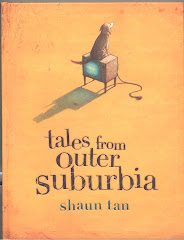The Graveyard Book, by Neil Gaiman [US]
Harper Collins, 2008. ISBN: 978-0-06-053092-1 312 pages
Gaiman's recent Newberry winner is, as is expected from this author, darkly unusual. The story of a young boy who grows up and comes of age in a British graveyard, the novel sees Bod, the protagonist, interact with all manner of fantastic creature -- ghosts, ghouls, werewolves, vampires -- as he struggles to escape the mysterious killer who is trying to track him down.
Bod's innocence is compelling, and the goodbye which concludes the story is very poignant. Gaiman's imagery is dangerously close to nightmare at times, and this is not the story for the sensitive child. Personally, I find the sprawling, gray style of the illustrations off-putting, but they do not distract from the story. Not exactly bedside reading, but a very interesting and distinctive story, well worth sharing.
Home of the Brave, by Katherine Applegate [US]
Square Fish, 2007. ISBN: 978-0-312-53563-6 267 pages
Kek is a young Sudanese refugee boy who finds himself strangely safe in the frozen world of Minnesota. Literally torn from his mother, Kek is lonely, and hungry for the love of his cousin. As he finds his way in this new and puzzing society, he clings to the symbols and memories that give his life meaning, yet finds new friends, and a different kind of strength of self.
The story is told in the poetic-fragment-making-a-narrative style used successfully by Jacqueline Woodson and Sharon Creech, and the simple, evocative language is accessible and easy to follow. Kek is very likeable, and young readers will empathize with his longing for kinship and struggle to make sense of the strange world around him. The book is rather "over-endowed" with endnotes and discussion questions, but the story itself would be an excellent companion to study and discussion about global migration and cultural identity.
How to Steal a Dog, by Barbara O'Connor [US]
Square Fish, 2007. ISBN: 978-0-312-56112-3
O'Connor's protagonist, Georgina, is struggling with the extreme poverty of her family. Dad has deserted, and Mom works two jobs, and still has no money for rent -- the family lives out of their car. With her reluctant younger brother in tow, Georgina decides to steal a dog so that she can earn the reward money. The plan backfires, and the new people she meets teach her much about social responsibility. Although this subject matter is "heavy," the novel is very readable. Characters are credible -- it's hard not to like Georgina -- and the plot is a good example of multiple levels of conflict. A great opener to discussions about urban poverty and social values.
Lost Riders, by Elizabeth Laird [UK]
Macmillan, 2008. ISBN: 978-0-230-52895-6
Laird, author of The Garbage King and Oranges in No Man's Land, has a strong commitment to provoking discussion about child poverty, and other issues of global equity. In this book, Rashid, a young Pakistani boy, finds himself sold into slavery in the UAE, racing camels for wealthy Arab investors. Conditions are harsh -- even inhumane -- and Rashid's inner strength, and family and friendship ties, are sorely tried. A very readable story, with vivid imagery to illustrate the action. Although the ending seems rather contrived, it underscores Laird's central theme of hope winning out over despair.
The Underneath, by Kathi Appelt [US]
Atheneum, 2008. ISBN: 9781416950585 311 pages
This a very special book, in the class of Charlotte's Web and other much-loved animal stories. Appelt beautifully evokes the swampy, mysterious, and rich world of a Texas bayou and the creatures -- human and animal, good and evil -- which inhabit it. Stylistically, chapters are short, and descriptive, and at least two major plots are interwoven. The principal plotline involves a the hero journeys of hound-dog and two kittens, who face danger at the hands of the twisted man who owns the dog. Braided through their story is the tale of mysterious creatures who are half-animal, half-human, and who find their immortality in swamp legend. An incredible, and very unusual novel, which would work well as a read-aloud.
Monday, January 4, 2010
Subscribe to:
Comments (Atom)
